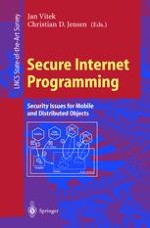Large-scale open distributed systems provide an infrastructure for assembling global applications on the basis of software and hardware components originating from multiple sources. Open systems rely on publicly available standards to permit heterogeneous components to interact. The Internet is the archetype of a large-scale open distributed system; standards such as HTTP, HTML, and XML, together with the widespread adoption of the Java language, are the cornerstones of many distributed systems. This book surveys security in large-scale open distributed systems by presenting several classic papers and a variety of carefully reviewed contributions giving the results of new research and development. Part I provides background requirements and deals with fundamental issues in trust, programming, and mobile computations in large-scale open distributed systems. Part II contains descriptions of general concepts, and Part III presents papers detailing implementations of security concepts.
